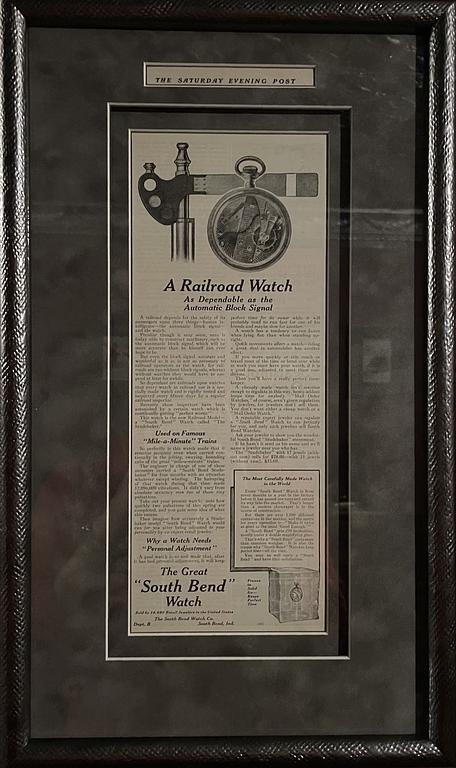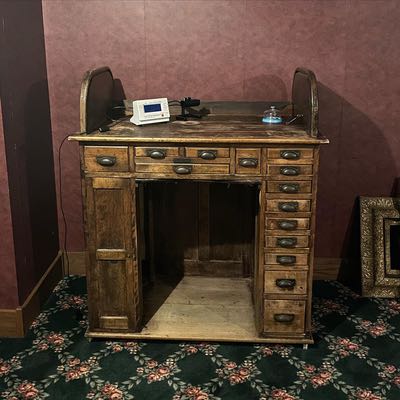
As Dependable as the Automatic Block Signal
A railroad depends for the safety of its passengers upon three things -- human intelligence -- the automatic block signal -- and the watch.
Peculiar though it may seem, man is today able to construct machinery, such as the automatic block signal, which will be more accurate than he himself can ever hope to be.
But even the block signal, accurate and wonderful as it is, is not so necessary to railroad operators as the watch, for railroads are run without block signals, whereas without watches they would have to suspend at least for awhile.
So dependent are railroads upon watches that every watch in railroad use is a specially made watch and is rigidly tested and inspected every fifteen days by a regular railroad inspector.
Recently these inspectors have been astonished by a certain watch which is continually getting "perfect scores".
This watch is the new Railroad Model -- a "South Bend" Watch called "The Studebaker."
Used on Famous "Mile-a-Minute" Trains
So perfectly is this watch made that it remains accurate even when carried continually in the jolting, swaying, bounding cabs of the great "mile-a-minute" trains.
The engineer in charge of one of these monsters carried a "South Bend Studebaker" for four months with no attention whatever except winding. The hairspring of that watch during that time made 12,096,000 vibrations. It didn't vary from absolute accuracy even two of those tiny pulsations.
Take out your present watch; note how quickly two pulsations of this spring are completed, and you gain some idea of what this means.
Then imagine how accurately a Studebaker model "South Bend" Watch would run for you after being adjusted to your personality by an expert retail jeweler.
Why a Watch Needs "Personal Adjustment"
A good watch is so well made that, after it has had personal adjustment, it will keep perfect time for its owner while it will probably tend to run fast for one of his friends and maybe slow for another.
A watch has a tendency to run faster when lying flat than when standing upright.
Quick movements affect a watch -- riding a great deal in automobiles has another effect.
If you move quickly or ride much or travel most of the time or bend over while at work you must have your watch, if it is a good one, adjusted to meet these conditions.
Then you'll have a really perfect timekeeper.
A cheaply made watch isn't sensitive enough to regulate in this way, hence seldom keeps time for anybody. "Mail Order Watches," of course, aren't given regulation by jewelers, for jewelers don't sell them. You don't want either a cheap watch or a "Mail Order Watch."
A reputable expert jeweler can regulate a "South Bend" Watch to run perfectly for you, and only such jewelers sell South Bend Watches.
Ask your jeweler to show you the wonderful South Bend "Studebaker" movement.
If he hasn't, send us his name and we'll name a jeweler near you who has.
The "Studebaker" with 17 jewels (without case) sells for $24.00 -- with 21 jewels (without case), $35.00.
The Most Carefully Made Watch in the World
Every "South Bend" Watch is from seven months to a year in the factory before it has passed our tests and earned its way into the market. That's longer than a modern skyscraper is in the course of construction.
But there are over 1,500 different operations in the making, and the motto for every operation is -- "Make it twice as good as the usual 'Good Enough.'"
A "South Bend" gets 250 inspections mostly under a double magnifying glass.
That's why a "South Bend" costs more than common watches. It is also the reason why "South Bend" Watches keep perfect time -- all the time.
You may as well carry a "South Bend" and have that satisfaction.
The Great "South Bend Watch"
Sold by 14,680 Retail Jewelers in the United States.







